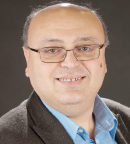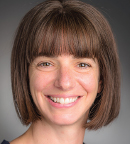
Basem M. William, MD, MRCP (UK), FACP
Basem M. William, MD, MRCP (UK), FACP, Director of the T-Cell Lymphoma Program and Member of the Blood and Marrow Transplant Program at The Ohio State University Comprehensive Cancer Center, Columbus, said many of the new-generation bispecific antibodies are “highly promising.” He said they “are easier to use [than chimeric antigen receptor (CAR) T-cell therapy] in the community setting, and responses appear to be durable.”
Specifically commenting on mosunetuzumab, Dr. William was impressed with its efficacy in patients who experience disease progression after CAR T-cell therapy and with the fact that it can be stopped, without detriment, in complete responders. “If patients experience disease progression after stopping mosunetuzumab, they can regain a response when re-treated. That’s a nice thing. It means you may not have to give the drug continuously to patients who achieve a good response. In fact, that’s unique,” he noted.
REGN1979: Long-Term Data Awaited

Caron Jacobson, MD
Whether the same quality is true for REGN1979 was asked by Caron Jacobson, MD, Assistant Professor of Medicine and Director of the Immune Effector Cell Therapy Program at Harvard Medical School, Boston, who co-moderated a session on novel therapies for aggressive lymphomas. She also wondered whether continuous dosing will be required with the newer bispecific antibodies or the drug can be held for complete responders, with monitoring for maintenance of response. Especially since CAR T-cell therapy is a “one-time treatment,” she said, this feature of the drug would be attractive. “Whether you can hold REGN1979 or need repeated dosing—and whether remissions are durable—these issues would be the comparators [with CAR T-cell therapy],” Dr. Jacobson stated.
That question aside, Dr. Jacobson said the results for REGN1979 were “very impressive,” especially in indolent lymphomas. “What we need to see is durability of response. It looked like the progression-free survival curve plateaus at around 40%, but we want to see long-term follow-up data.”
DISCLOSURE: Dr. William has served as a consultant or advisor to Celgene, Guidepoint Global, Kyowa Hakko Kirin, miRagen, Navicor, and Triangle Insights; and has received research funding from Dova Pharmaceuticals, Incyte, Innate Pharma, Kite/Gilead, Merck, and miRagen. Dr. Jacobson has served as a consultant for Kite, Novartis, Celgene, Bristol-Myers Squibb, Humanigen, Precision Biosciences, and Nkarta; and has received research funding from Pfizer.

